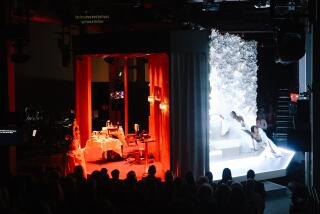MUSIC REVIEW : EARLY MUSIC ENSEMBLE AT OCCIDENTAL
- Share via
The double vision necessary in performing ancient music for modern ears is not always clearly focused on either past or present. The Early Music Ensemble of Los Angeles offered an ambitious Monteverdi program Saturday night to a large, supportive audience at Occidental College with decidedly mixed results.
The centerpiece was a staged version of the “Combattimento di Tancredi e Clorinda.” Monteverdi relied on fluent, narrative arioso, supported with pictorial effects from accompanying strings, to tell the story of a Crusader knight killing a Muslim opponent, who turns out to be the woman he loves, disguised in male armor.
This scene is a portion of an epic by Torquato Tasso. There is no explanation of why Clorinda is in armor, or fighting Tancredi alone at night. The plunge in medias res requires the uninformed modern listener to abandon all concern for motivation or character. That may be just as well, since Monteverdi gave Clorinda (Diana Zaslove) and Tancredi (Jose Gomez) very little to sing. Unable to choose between realism and abstraction, stage director James Hatch gave them only ponderous, vaguely Oriental, often unintentionally funny, mime.
Everything depends on the narrator, whom Hatch inexplicably presented as a bishop. Scott Whitaker tackled the part with sardonic relish, finding anticlerical cynicism where Tasso offered only moralistic piety.
Vocally, all three delivered the Italian text clearly, with little vibrato. Whitaker, however, proved chronically flat and took few of the opportunities to embellish his declamatory part. Edward Cansino presided over a string quartet and harpsichord in the Thorne Hall pit.
David Robinson designed a serviceable set, covered with outsize battle debris and dry-ice mist, lit moodily by Robert Walker. Lisa Heftmann’s generalized Renaissance costumes lacked vestiges of visors for Clorinda and Tancredi, making their failure to recognize each other incomprehensible.
Other pieces from Monteverdi’s eighth book of madrigals completed the program. The 45-voice ensemble is large for this repertory, but Cansino kept them well balanced and sprightly in numbers like “Su pastorelli vezzosi.” However, pitch problems and a lack of vocal presence in the acoustically inert hall dogged their efforts in the more complex pieces.
Soprano Zaslove’s vibrato did not accord well with the prevailing standard of production, but her engaging, accurate voice proved most welcome. She warbled “Chi vol haver felice” gracefully and distinguished the “Lamento della ninfa” quartet.
More to Read
The biggest entertainment stories
Get our big stories about Hollywood, film, television, music, arts, culture and more right in your inbox as soon as they publish.
You may occasionally receive promotional content from the Los Angeles Times.










